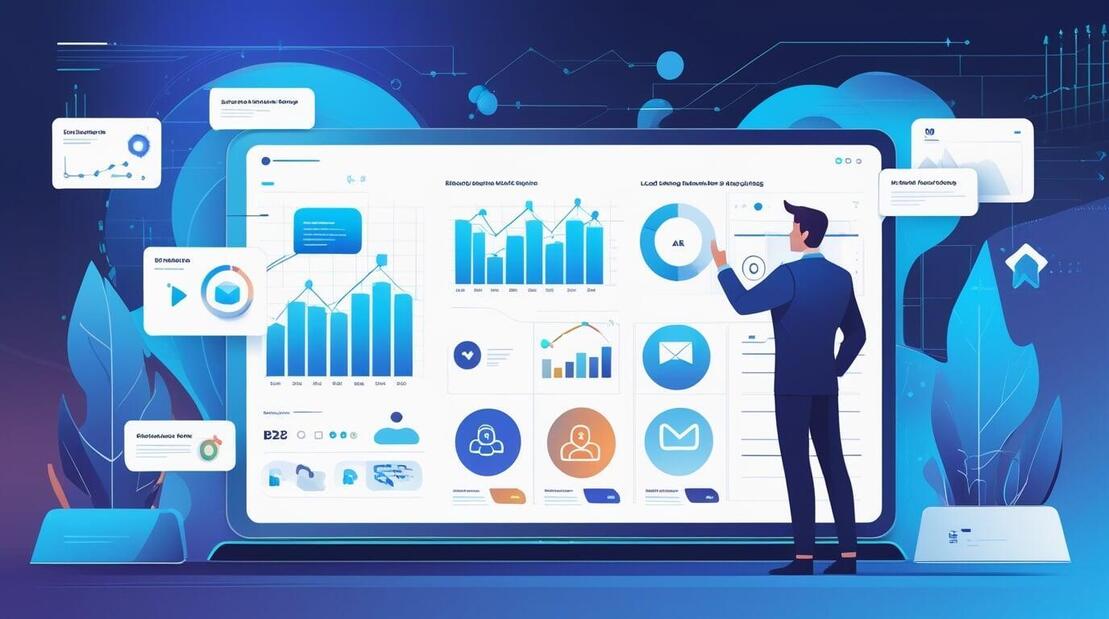In today's highly competitive digital marketplace, businesses are rapidly turning to AI-powered solutions to gain an edge—especially when it comes to B to B lead generation. Artificial Intelligence has emerged as a game-changer, redefining how companies identify, attract, and convert leads. If you're not already leveraging AI in your lead generation strategy, you might be leaving significant growth on the table.
In this article, we’ll explore how AI is reshaping B to B lead generation, which tools are leading the charge, and how you can implement AI to streamline and scale your marketing efforts.
What Is B to B Lead Generation and Why AI Matters?
B to B lead generation refers to the process of identifying and attracting potential business customers who are likely to purchase your product or service. Traditionally, this has involved cold emails, trade shows, and manual outreach. But in 2025 and beyond, relying on outdated methods just won’t cut it.
Artificial Intelligence brings precision, scalability, and predictive power to the lead generation process. With AI, businesses can:
Predict customer behavior
Personalize outreach at scale
Score leads more effectively
Automate repetitive tasks
These advancements allow marketing and sales teams to focus more on strategy and relationship-building rather than manual prospecting.
How AI Is Transforming B to B Lead Generation
Here are the top ways AI is revolutionizing B to B lead generation:
1. Predictive Lead Scoring
AI algorithms can analyze past customer behaviors and engagement patterns to assign scores to new leads. This predictive lead scoring helps sales teams prioritize the most promising prospects, reducing time spent on unqualified leads.
2. Enhanced Customer Segmentation
AI tools can process massive data sets to segment audiences more accurately. Instead of simple demographic filters, AI analyzes firmographics, buying signals, behavior, and engagement to create dynamic customer profiles.
3. AI-Powered Chatbots
Modern chatbots are far more than simple Q&A tools. AI chatbots like Drift and Intercom qualify leads, answer complex queries, and even schedule sales calls—24/7. They significantly enhance user experience and lead capture rates.
4. Personalized Email Campaigns
AI analyzes open rates, click-through behavior, and historical purchase data to send personalized email campaigns at optimal times. This increases the chances of converting cold leads into warm prospects.
5. Content Recommendation Engines
AI tools can suggest content that aligns with a user’s specific stage in the sales funnel. This ensures prospects are nurtured with the right message at the right time, which is critical for B to B lead generation success.
Top AI Tools for B to B Lead Generation
If you're ready to embrace AI in your business strategy, consider these popular tools that are revolutionizing B to B lead generation:
HubSpot Sales Hub – For lead scoring and automation
ZoomInfo – For AI-powered data enrichment and targeting
Salesforce Einstein – CRM automation and predictive analytics
Drift – Conversational marketing via smart chatbots
Leadfeeder – Identifies anonymous website visitors and turns them into leads
Each of these tools leverages artificial intelligence to eliminate guesswork and optimize your lead generation pipeline.
Benefits of Using AI in B to B Lead Generation
The benefits of AI in B to B lead generation go far beyond automation. Here are some critical advantages:
Improved Lead Quality: More relevant leads based on real data
Faster Conversions: Streamlined sales funnel with timely interventions
Lower Costs: Less manual work means reduced labor and ad spend
Data-Driven Decisions: AI insights help fine-tune marketing strategies
24/7 Engagement: Chatbots and email automation ensure no lead is lost
Challenges and How to Overcome Them
Despite the advantages, there are a few challenges in adopting AI for B to B lead generation:
Data Quality Issues: AI is only as good as the data it uses
Integration Complexity: Combining AI with existing systems may need technical support
Cost Barrier: Advanced AI tools may require higher upfront investment
Solution: Start small with AI features built into your existing CRM or marketing platform. Once you see ROI, scale your AI efforts with more robust tools.
How to Implement AI in Your Lead Generation Strategy
Here’s a quick guide to get started with AI for B to B lead generation:
Audit Your Existing Data: Ensure it’s clean and well-organized
Set Clear Objectives: Know what you want—more leads, better quality, higher conversion?
Choose the Right AI Tools: Match tools with your goals and team capabilities
Train Your Team: Ensure staff understands how to use AI insights effectively
Measure & Optimize: Use KPIs like conversion rates, cost-per-lead, and customer lifetime value to track progress
The Future of B to B Lead Generation Is AI-Driven
AI is no longer a futuristic buzzword—it’s a present-day necessity. As we move further into the digital age, embracing AI for B to B lead generation will become critical to staying competitive. Companies that adopt these technologies early will gain a significant advantage in capturing high-value business leads efficiently and intelligently.
Final Thoughts
Whether you’re a startup or an established B2B brand, integrating AI into your lead generation process can unlock faster growth, smarter targeting, and deeper customer insights. Now is the time to evaluate your strategy, leverage data-driven tools, and ride the AI wave to greater success in B to B lead generation.


